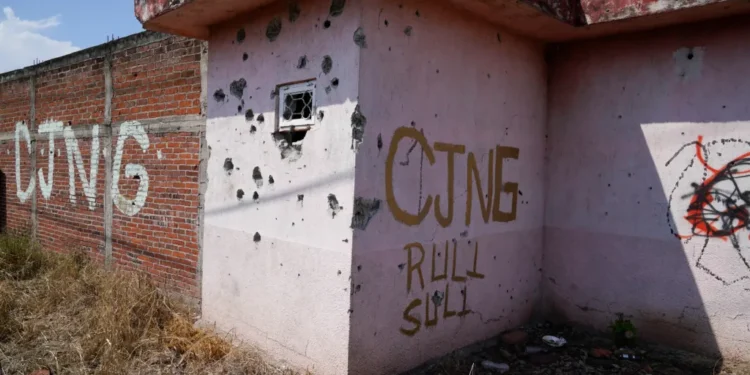In Focus delivers deeper coverage of the political, cultural, and ideological issues shaping America. Published daily by senior writers and experts, these in-depth pieces go beyond the headlines to give readers the full picture. You can find our full list of In Focus pieces here.
President Donald Trump posited a rhetorical question last weekend. “Would I launch strikes in Mexico to stop drugs?” Trump asked, continuing, “It’s okay with me. Whatever we have to do to stop drugs.”
Really? “Whatever we have to do?”
I think not. Drug cartel activity from Mexico poses a far greater threat to U.S. national security and well-being than that of drug cartel activity out of Venezuela or Colombia. And it’s not even close. These cartels smuggle truly vast amounts of drugs of all kinds across the United States border every day. The DEA’s courage notwithstanding, the scale of drug smuggling makes drug seizures and indictments almost ludicrous in comparison. And Trump has so far limited his direct-action campaign against the drug cartels to Venezuela. The same applies to the sharper edges of CIA covert action.
TRUMP RIGHTLY FETES MOHAMMED BIN SALMAN AT THE WHITE HOUSE
However, in light of growing protests in Mexico against the drug cartels and the apparent unwillingness of President Claudia Sheinbaum’s government to take more robust action against them, it’s worth asking why Trump is sparing the Mexican cartels from more robust American action. There are indications that the Trump administration intends to bolster direct action against the two Mexican kingpin cartels: the Sinaloa Cartel and the Jalisco New Generation Cartel. Trump has designated both as foreign terrorist organizations, and his Ambassador to Mexico City is a former CIA paramilitary officer. Still, Trump’s action against the Mexican cartels has thus far only involved boosted intelligence gathering operations and bolstered domestic law enforcement operations.
The CJNG is now the most dominant cartel in Mexico. It has pared back the power of other cartels, including El Chapo Guzman’s once supreme Sinaloa Cartel. It has done so through its application of extreme aggression, financial creativity, and, more recently, by taking advantage of the Sinaloa Cartel’s internal conflicts. The CJNG revels in violence that makes Islamic State terrorists look timid by comparison. Smuggling Fentanyl, Cocaine, and drugs of all types across the U.S. border to their strongholds in cities including Los Angeles, New York, Chicago, Houston, and Atlanta, the CJNG has built a highly lucrative American empire. CJNG operations targeting the U.S. include fraud, human smuggling, and money laundering. Operations in Mexico range from shaking down Avocado farmers to stealing from the state oil company.
The degree to which the drug trade precipitates street violence and associated criminality underlines why Trump is justified in part in using force against cartels in their overseas bastions.
Mexico needs a stronger hand against these cartels.
Led by Nemesio [Rubén] Oseguera Cervantes, also known as ‘El Mencho,’ the CJNG ensures that politicians and security officials who dare challenge it face rapid, brutal executions. This threat is particularly problematic when it comes to local mayors who lack the kind of protection afforded to Mexican regional governors and federal politicians.
Consider Carlos Manzo, the mayor of Uruapan in the central Mexican state of Michoacán. Rejecting corruption and confronting the cartels for their extortion of Avocado farmers, Manzo was gunned down on Nov. 1 as he celebrated “Day of the Dead” at a public carnival. The well-sourced El Pais reports that the CJNG was responsible for the assassination. Sadly, neither the Michoacán regional government nor Sheinbaum’s administration shares Manzo’s courage and incorruptibility. This underlines why a growing protest movement is rising to demand better justice in his memory. This included a rare march outside the presidential palace last weekend.
The protesters’ courageous rage is impressive. But the CJNG’s threat is only growing.
While Sheinbaum’s Morena Party and her predecessor, Andrés Manuel López Obrador, have traditionally maintained close links to the Sinaloa Cartel, political obedience to the CJNG will likely grow alongside its power. There has certainly been no sign of the kind of robust federal crackdown that the CJNG’s threat to Mexican sovereignty plainly requires. Just as it’s easy to snort Cocaine and pretend that the ensuing ecstasy carries no consequences for American street corners and Mexican stability, it’s easy and profitable to be a coward in Mexican politics. It’s very dangerous to be an honorable public servant.
The CJNG’s perverse reach extends across Latin America. The group retains a close alliance with the Ecuador-based Los Lobos (Wolves) crime group, for example. Responsible for the Aug. 2023 assassination of Ecuadorian presidential candidate Fernando Villavicencio, the Wolves then covered their tracks and showed their extraordinary reach by murdering seven members of the assassination team in prison. Although the group’s leader was recently arrested in Spain, it remains a powerful organization. Similar to the CJNG in Mexico, the Wolves pose a threat to Ecuador’s democratic stability.
The question bears repeating, then, why has Trump spared the CJNG and the Sinaloa Cartel the ferocity that has defined his repeated strikes on drug boats departing Venezuela?
The answer appears to be twofold. First, a concern that escalated U.S. action against these cartels might lead President Sheinbaum to suspend cooperation with the U.S. on counter-drug activities. This is something Mexican governments have frequently threatened during previous disagreements with Washington. Second, there is a fear that the CJNG might retaliate against U.S. interests.
These concerns are legitimate. The CJNG has the military capacity to conduct terrorist attacks against Americans. And yet, Trump’s excess deference to hesitation clearly undermines his pledge to do “Whatever we have to do to stop drugs.”
It’s impossible, of course, to totally or even substantially reduce the flow of drugs on to U.S. soil (any true reduction would require removing the huge profit incentive afforded by millions of American daily drug users). But Trump could take action against the cartels in a way that increases their cost and complexity of doing business. That might, in turn, gradually translate into higher street prices, a measure of reduced demand for drugs, and some weakening of the cartels and their ability to spread corruption and criminality.
How to do it?
Trump could, for example, direct the CIA’s paramilitary wing to launch unilateral capture-kill missions against cartel leaders and their enablers in the Mexican government and security forces. These individuals could then be removed to the U.S. for later prosecution or detention as foreign terrorist combatants. Trump could also order drone strikes or other attacks on cartel strongholds and safe havens. Alternatively, he could order the NSA to engage in cyber pilfering actions designed to remove funds from cartel accounts and/or crash the websites of banks that enable the cartels. He could name and shame those who help the cartels, such as Sinaloa Cartel partner and Albanian prime minister Edi Rama.
All these actions would increase the physical, financial, and psychological cost of doing business for and with the cartels. And while the risks of destabilizing Mexico are real, the current status quo is hardly sustainable. The aspiration of any direct action against the cartels would be to provoke a greater effort from Mexican authorities against the cartels and to encourage courageous Mexican public servants and citizens to be emboldened by U.S. action. But Trump would need to be ready to out-escalate the cartels by wreaking havoc upon them if they moved against U.S. citizens.
DEMOCRATS RECKON WITH LOFTY OBAMACARE PROMISES AFTER SHUTDOWN DEFEAT
Yes, Trump can instead keep doing what he’s been doing, marginally increasing pressure on the cartels in terms of their U.S. operations and bolstering U.S. intelligence understanding of where and how they operate.
But that’s not going to move the needle against drug smuggling onto U.S. soil. And when judged against Trump’s far greater action against a lesser, if significant, drug threat from Venezuela, it suggests the president’s strategy in Venezuela might ultimately not be about drugs, after all.

















